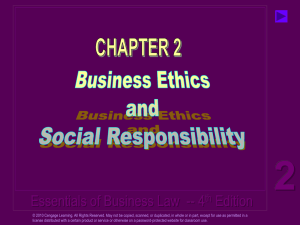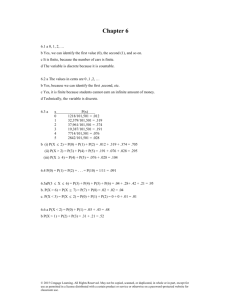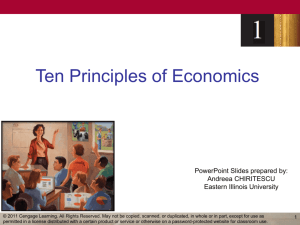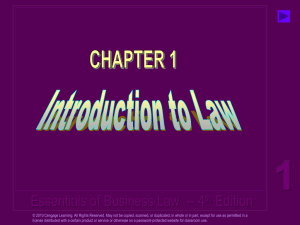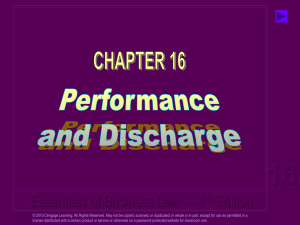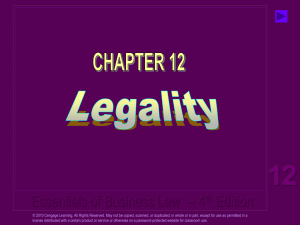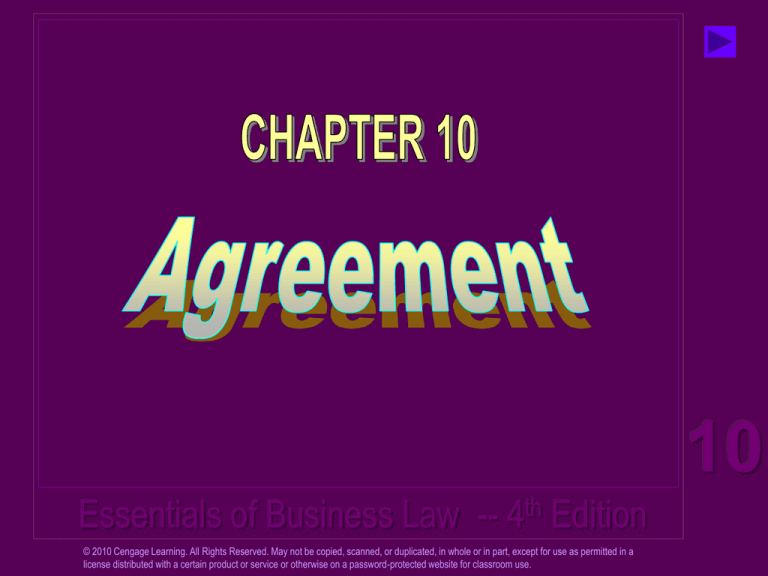
10
Essentials of Business Law -- 4th Edition
© 2010 Cengage Learning. All Rights Reserved. May not be copied, scanned, or duplicated, in whole or in part, except for use as permitted in a
license distributed with a certain product or service or otherwise on a password-protected website for classroom use.
Click your mouse
anywhere on the
screen when you are
ready to advance the
text within each slide.
After the starburst appears behind the blue
triangles, the slide is completely shown.
You may click one of the blue triangles to
move to the next slide or the previous slide.
Essentials of Business Law -- 4th Edition
© 2010 Cengage Learning. All Rights Reserved. May not be copied, scanned, or duplicated, in whole or in part, except for use as permitted in a
license distributed with a certain product or service or otherwise on a password-protected website for classroom use.
10
“It takes two to speak the truth -- one to
speak and one to hear.”
Henry David Thoreau,
American Philosopher
10
Essentials of Business Law -- 4th Edition
© 2010 Cengage Learning. All Rights Reserved. May not be copied, scanned, or duplicated, in whole or in part, except for use as permitted in a
license distributed with a certain product or service or otherwise on a password-protected website for classroom use.
The parties can form a contract only if
they had a meeting of the minds.
• They must understand each other and
intend to reach an agreement.
• A judge will make an objective assessment
of any disagreements about whether a
contract was made -- whether or not a
reasonable person would conclude that
there was an agreement, based on the
parties’ conduct.
Essentials of Business Law -- 4th Edition
© 2010 Cengage Learning. All Rights Reserved. May not be copied, scanned, or duplicated, in whole or in part, except for use as permitted in a
license distributed with a certain product or service or otherwise on a password-protected website for classroom use.
10
An offer is an act or statement that proposes
definite terms and permits the other party to
create a contract by accepting those terms.
Problems with Intent
Problems with Definiteness
• Invitation to bargain is not an offer.
• Price quote is generally not an offer.
• A letter of intent may help clarify progress in
negotiation, but may or may not be binding.
• An advertisement is generally not an offer.
• Placing an item up for auction is not an offer, it is
merely a request for an offer.
• The terms of the offer must be definite.
Essentials of Business Law -- 4th Edition
© 2010 Cengage Learning. All Rights Reserved. May not be copied, scanned, or duplicated, in whole or in part, except for use as permitted in a
license distributed with a certain product or service or otherwise on a password-protected website for classroom use.
10
The UCC has provisions for supplying some
missing contract terms.
Open Price
• The UCC establishes a price, based on market
value or valuation by a neutral party.
Output and Requirements Provisions
• An output contract obligates a seller to sell all of
his output to one buyer, who agrees to buy it.
• A requirements contract obligates a buyer to
obtain all of his needed goods from the seller.
• The UCC requires parties to act in good faith.
Essentials of Business Law -- 4th Edition
© 2010 Cengage Learning. All Rights Reserved. May not be copied, scanned, or duplicated, in whole or in part, except for use as permitted in a
license distributed with a certain product or service or otherwise on a password-protected website for classroom use.
10
Delivery, Time, and Payment
• Usually, delivery is at the seller’s business,
time must be reasonable and payment is
due upon receipt of goods.
Warranties
• An implied warranty of merchantability,
means that the goods must be of at least
average, passable quality in the trade.
• An implied warranty of fitness means the
goods are suitable for a particular purpose.
Essentials of Business Law -- 4th Edition
© 2010 Cengage Learning. All Rights Reserved. May not be copied, scanned, or duplicated, in whole or in part, except for use as permitted in a
license distributed with a certain product or service or otherwise on a password-protected website for classroom use.
10
Termination by Revocation
• Effective when the offeree receives it.
Firm Offers and Revocability
• Common Law Rule
– Revocation of a firm offer is effective if the offeree
receives it before he accepts.
• Option Contract
– The offeror may not revoke an offer during the
option period.
• Sale of Goods
– A writing signed by a merchant, offering to hold
an offer open, may not be revoked.
Essentials of Business Law -- 4th Edition
© 2010 Cengage Learning. All Rights Reserved. May not be copied, scanned, or duplicated, in whole or in part, except for use as permitted in a
license distributed with a certain product or service or otherwise on a password-protected website for classroom use.
10
Termination by Rejection
• If an offeree rejects an offer, the rejection
immediately terminates the offer.
• A counteroffer is a rejection; it terminates the offer.
Termination by Expiration
• When an offer specifies a time limit for acceptance,
that period if binding.
• If the offer specified no time limit, the offeree has a
reasonable period in which to accept.
Termination by Operation of Law
• Death or mental incapacity of the offeror terminates
an offer.
• Destruction of subject matter terminates offer.
Essentials of Business Law -- 4th Edition
© 2010 Cengage Learning. All Rights Reserved. May not be copied, scanned, or duplicated, in whole or in part, except for use as permitted in a
license distributed with a certain product or service or otherwise on a password-protected website for classroom use.
10
The offeree must say or do something
to accept.
• In a bilateral contract, the offeree generally
must accept by making a promise.
• In a unilateral contract, the offeree must
accept by performing.
• If the offer is ambiguous, the offeree may
accept by either a promise or performance.
Mirror Image Rule (Common Law)
• Requires that acceptance be on precisely
the same terms as the offer.
Essentials of Business Law -- 4th Edition
© 2010 Cengage Learning. All Rights Reserved. May not be copied, scanned, or duplicated, in whole or in part, except for use as permitted in a
license distributed with a certain product or service or otherwise on a password-protected website for classroom use.
10
An offeree may include in the
acceptance terms that are additional to
or different from those in the offer.
• Additional terms are those that bring up
new issues.
– If both parties are merchants, the additional
terms will generally become part of the contract.
• Different terms are those that contradict
terms in the offer.
– The majority of states hold that different
(contradictory) terms cancel each other out.
Essentials of Business Law -- 4th Edition
© 2010 Cengage Learning. All Rights Reserved. May not be copied, scanned, or duplicated, in whole or in part, except for use as permitted in a
license distributed with a certain product or service or otherwise on a password-protected website for classroom use.
10
A license agreement on a computer
program, which asks the user to “read the
terms and click here if you agree” is
called a “Clickwrap.”
A license agreement inside a sealed
package which tells the user that
“inserting the CD indicates that you agree
with the terms” is called a “Shrinkwrap.”
Clickwraps and shrinkwraps often include
arbitration clauses.
Essentials of Business Law -- 4th Edition
© 2010 Cengage Learning. All Rights Reserved. May not be copied, scanned, or duplicated, in whole or in part, except for use as permitted in a
license distributed with a certain product or service or otherwise on a password-protected website for classroom use.
10
Medium and Manner of Acceptance
• If an offer demands acceptance in a
particular medium or manner, the offeree
must follow those requirements.
• If the offer does not specify a type of
acceptance, the offeree may accept in any
reasonable manner and medium.
Time of Acceptance: The Mailbox Rule
• An accceptance is generally effective upon
dispatch, meaning the moment it is out of
the offeree’s control.
Essentials of Business Law -- 4th Edition
© 2010 Cengage Learning. All Rights Reserved. May not be copied, scanned, or duplicated, in whole or in part, except for use as permitted in a
license distributed with a certain product or service or otherwise on a password-protected website for classroom use.
10
10
Essentials of Business Law -- 4th Edition
© 2010 Cengage Learning. All Rights Reserved. May not be copied, scanned, or duplicated, in whole or in part, except for use as permitted in a
license distributed with a certain product or service or otherwise on a password-protected website for classroom use.


